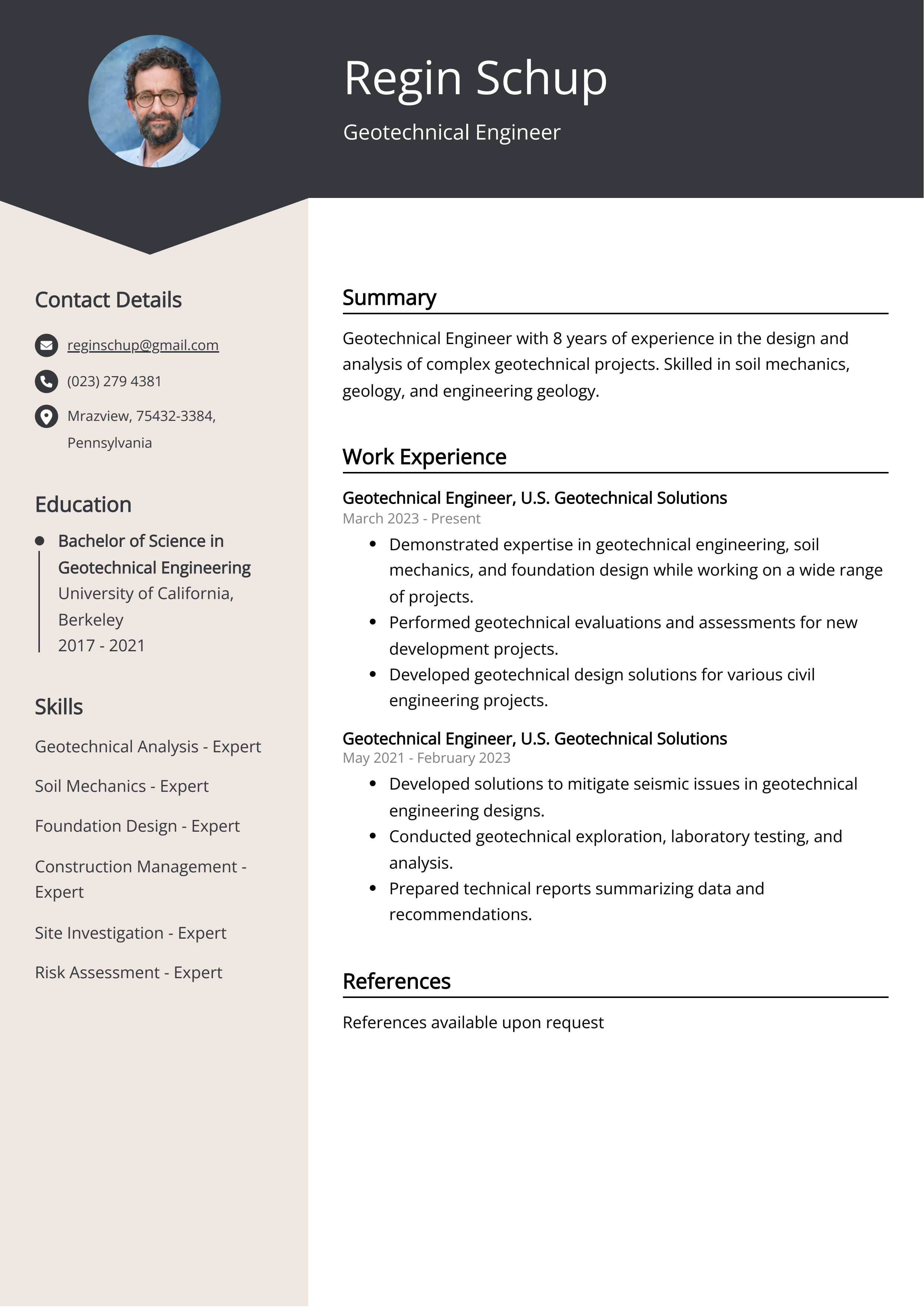Some Known Facts About Geotheta.
Some Known Facts About Geotheta.
Blog Article
Our Geotheta Diaries
Table of ContentsThe Only Guide to GeothetaThe Main Principles Of Geotheta Geotheta - TruthsSome Known Details About Geotheta The Best Strategy To Use For Geotheta

They carry out website investigations, accumulate examples, perform lab tests, and examine data to assess the viability of the ground for building and construction projects - Geotechnical Engineers. Based upon their searchings for, geotechnical engineers offer recommendations for structure design, incline stability, preserving structures, and reduction of geotechnical threats. They collaborate with other specialists, such as designers, architectural engineers, and building teams, to guarantee that geotechnical factors to consider are incorporated into the overall project style and application
By examining the habits and residential properties of soil and rock, they can identify potential geotechnical threats such as landslides, dirt negotiation, or slope instability. Their know-how aids avoid failings or crashes that can endanger lives and property. Below are some thorough obligations and responsibilities of a geotechnical engineer: Website Investigation: Geotechnical designers conduct site examinations to gather data on subsurface problems.
They translate the data to comprehend the properties and habits of the dirt and rock, including their strength, permeability, compaction features, and groundwater conditions. Geotechnical Analysis and Design: Geotechnical engineers evaluate the information gathered throughout site examinations to analyze the security and suitability of the website for building tasks. They do geotechnical calculations and modeling to evaluate variables such as birthing ability, settlement, slope stability, side earth stress, and groundwater flow.
Indicators on Geotheta You Should Know
Structure Layout: Geotechnical engineers play a crucial role in developing structures that can safely sustain the intended structure. They assess the dirt conditions and tons needs to establish the suitable structure kind, such as superficial foundations (e.g., footings), deep structures (e.g (https://profile.hatena.ne.jp/geotheta/)., stacks), or specialized strategies like dirt improvement. They take into consideration factors such as settlement limitations, birthing ability, and soil-structure interaction to develop ideal foundation designs
They assess building plans, display site tasks, and conduct area inspections to verify that the design suggestions are followed. If unforeseen geotechnical problems emerge, they assess the circumstance and give suggestions for remediation or adjustments to the style. Threat Analysis and Mitigation: Geotechnical engineers evaluate geotechnical risks and risks connected with the project website, such as landslides, liquefaction, or dirt erosion.

Cooperation and Communication: Geotechnical engineers work very closely with various other experts associated with a job, such as designers, architectural designers, and building and construction groups. Efficient interaction and collaboration are important to integrate geotechnical factors to consider right into the total job layout and building and construction process. Geotechnical designers supply technical experience, answer questions, and make sure that geotechnical demands are satisfied.
The Only Guide for Geotheta
Here are some sorts of geotechnical designers: Structure Engineer: Structure designers concentrate on developing and analyzing structures for frameworks. They evaluate the soil problems, load needs, and website features to figure out one of the most ideal structure type and layout, such as superficial structures, deep structures, or specialized techniques like pile foundations.
They review the variables affecting slope security, such as dirt residential or commercial properties, groundwater problems, and slope geometry, and create methods to stop slope failings and minimize risks. Earthquake Engineer: Quake engineers focus on analyzing and designing structures to hold up against seismic pressures. They evaluate the seismic danger of a site, review soil liquefaction possibility, and create seismic layout standards to make sure the security and durability of structures throughout earthquakes.
They perform field testing, accumulate examples, and assess the gathered information to identify the dirt residential properties, geologic formations, and groundwater problems at a website. Geotechnical Instrumentation Designer: Geotechnical instrumentation engineers concentrate on surveillance and gauging the actions of dirt, rock, and structures. They set up and keep instrumentation systems that keep track of factors such as soil negotiation, groundwater degrees, incline activities, and structural variations to evaluate efficiency and give very early cautions of potential issues.
Geotheta Can Be Fun For Anyone
They carry out tests such as triaxial tests, consolidation examinations, straight shear tests, and permeability tests to gather information for geotechnical evaluation and design. Geosynthetics Designer: Geosynthetics engineers specialize in the layout and application of geosynthetic products, such as geotextiles, geogrids, and geomembranes. They use these products to boost dirt security, reinforce inclines, supply drain solutions, and control disintegration.
They have a tendency to be investigatory individuals, which suggests they're intellectual, reflective, and analytical. They are curious, methodical, rational, logical, and logical. Some of them are likewise social, indicating they're kind, generous, cooperative, individual, caring, handy, compassionate, skillful, and friendly - Tailings Engineer.
In the office setting, geotechnical go to my blog designers use specialized software application devices to do calculations, develop designs, and assess data. They prepare reports, testimonial task specs, interact with clients and employee, and coordinate job activities. The office setting supplies a favorable atmosphere for research study, evaluation, and cooperation with other professionals associated with the job.
The smart Trick of Geotheta That Nobody is Talking About
They often go to task websites to conduct site examinations, assess geotechnical problems, and gather data for evaluation. These sees include taking a trip to various areas, often in remote or difficult terrains. Geotechnical engineers might carry out soil tasting, conduct examinations, and monitor construction activities to make sure that the geotechnical facets of the project are being applied correctly.
Geotechnical engineers additionally function in specialized geotechnical laboratories. In these facilities, they carry out experiments, carry out tests on dirt and rock examples, and assess the engineering buildings of the materials. Geotechnical laboratory engineers work extensively in these settings, managing testing devices, running instruments, and recording data. They work together with other laboratory team to make certain precise and trusted screening results.
Report this page